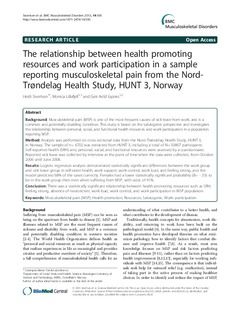The relationship between health promoting resources and work participation in a sample reporting musculoskeletal pain from the Nord-Trøndelag Health Study, HUNT 3, Norway
Journal article, Peer reviewed
Permanent lenke
http://hdl.handle.net/11250/302345Utgivelsesdato
2013Metadata
Vis full innførselSamlinger
Sammendrag
Background: Musculoskeletal pain (MSP) is one of the most frequent causes of sick leave from work, and is a common and potentially disabling condition. This study is based on the salutogenic perspective and investigates the relationship between personal, social, and functional health resources and work participation in a population reporting MSP.
Method: Analysis was performed on cross sectional data from the Nord-Trøndelag Health Study, HUNT 3,
in Norway. The sample of n= 6702 was extracted from HUNT 3, including a total of N= 50807 participants.
Self-reported health (SRH) and, personal, social, and functional resources were assessed by a questionnaire. Reported sick leave was collected by interview at the point of time when the data were collected, from October 2006 until June 2008.
Results: Logistic regression analysis demonstrated statistically significant differences between the work group and sick leave group in self-rated health, work support, work control, work load, and feeling strong, and the model predicted 68% of the cases correctly. Females had a lower statistically significant probability (B= −.53) to be in the work group then men when suffering from MSP, with odds of 41%.
Conclusion: There was a statistically significant relationship between health promoting resources such as SRH, feeling strong, absence of neuroticism, work load, work control, and work participation in MSP population.
Keywords: Musculoskeletal pain (MSP), Health promotion, Resources, Salutogenic, Work- participation
Beskrivelse
-

